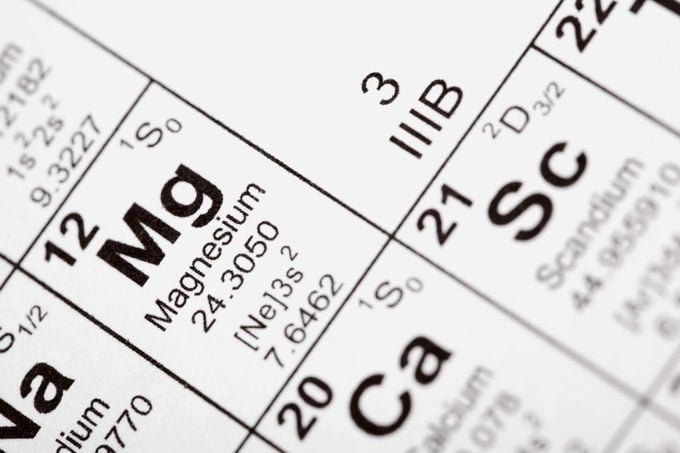How Much Magnesium You Should Take in a Day, with an Expert Doctor’s Detailed Wisdom
Updated: Apr. 16, 2024

Magnesium is "the relaxation mineral," but—no surprise—many Americans aren't getting enough. A doctor reveals the daily magnesium requirement, the best magnesium supplements, and natural ways to increase magnesium intake.
With nearly half of Americans falling short of their daily magnesium needs, it’s no surprise that magnesium supplements have been trending. In fact, the global magnesium supplements market was projected to value at $107 million in 2024, and anticipated to climb to $130 million by 2031. That’s a greater-than 20% jump over just a few years.
So, what’s the cause of this widespread magnesium shortfall? According to experts like Mark Hyman, MD, a leader in functional medicine, there are multiple reasons we’re not getting the recommended amounts of magnesium:
- Our meals are more processed and less nutrient-dense than ever before.
- The soil where our food grows is increasingly stripped of magnesium.
- Our consumption of coffee, alcohol, and sugar—all of which can diminish magnesium levels—is on the rise.
So by the time you see your doctor for muscle cramps or spasms, poor sleep, unexplained weight problems, urinary issues or another symptom of low magnesium, it’s likely you’ll discuss much magnesium should you take per day, and the best ways to get more magnesium.
Keep reading for clinical recommendations on magnesium intake.

What is magnesium?
Magnesium is a mineral involved in at least 300 enzyme reactions within the human body—and according to some studies, up to 600. This means magnesium is fundamental for muscle and nerve function, regulating blood sugar and blood pressure, and producing protein, bone, and DNA.
Given its central role in so many physiological functions, it’s clear why a magnesium deficiency can lead to symptoms such as fatigue, muscle cramps, mental issues, irregular heart rhythms, and increased stress.
9 Magnesium Benefits That May Help Save Your Life
Here’s how much magnesium you should take per day
The recommended dietary allowances for magnesium are specific to age, gender, and physiological conditions, says the National Institutes of Health:
- Men between 19 and 30 years old should consume 400 milligrams of magnesium
- Men 31 years and older should consume 420 milligrams of magnesium
- Women between 19 and 30 years old should consume 310 milligrams of magnesium
- Women 31 years and older should consume 320 milligrams of magnesium
- For pregnant individuals over age 18, an increased daily requirement of 350-360 milligrams is recommended.
The National Institutes of Health has set the upper limit of magnesium that you should take in supplement form at 350 milligrams. (Dr. Hyman suggests a daily supplemental magnesium intake of 300 milligrams.) However, consult your healthcare provider to determine the optimal amount for your unique needs, as some individuals may benefit from higher doses.
When selecting magnesium supplements, magnesium glycinate is often recommended for its ability to cross the blood-brain barrier, which can be beneficial for reducing anxiety and improving sleep quality.
If constipation is a concern, magnesium citrate may offer relief, though be cautious because excessive amounts could lead to diarrhea.
Magnesium L-threonate has also been shown to benefit brain health in a 2022 study.
Magnesium carbonate, oxide, or gluconate, are forms that research suggests are less efficiently absorbed by the body.
I Took Magnesium to Help Me Sleep for a Month—Here’s What Happened
How to get more magnesium
Magnesium supplements can work, but experts suggest adding magnesium-rich foods to your diet is the best way to increase magnesium intake:
- Dark leafy greens (spinach, kale)
- Nuts and seeds (pumpkin seeds, almonds, chia seeds)
- Whole grains (brown rice, quinoa)
- Legumes (black beans, chickpeas)
- Avocado
- Dark chocolate
Additionally, an Epsom salt bath is a relaxing way to absorb magnesium through the skin.
10 Ways Your Body Is Telling You You’re Running Low on Key Vitamins
Is it OK to take magnesium every day?
It is generally safe to take magnesium every day, provided you stick within the dosage guidelines recommended by your healthcare provider. Consistent, moderate intake supports your body without leading to adverse side effects.
12 Vitamin Mistakes You Might Not Realize You’re Making
Is it better to take magnesium in the morning or at night?
Taking magnesium at night may benefit those looking to improve their sleep quality, as it supports muscle relaxation and has been linked to a calming effect on the nervous system. However, if you are taking magnesium to support energy production or exercise recovery, the morning may be a more suitable time—just make sure you are taking it at the same time every day.
8 Vitamin Secrets Doctors Tell Their Friends
Who shouldn’t take magnesium?
People suffering from kidney disease, heart disease, intestinal disorders, diabetes, or those on specific medications such as bisphosphonates, antibiotics, diuretics, and proton pump inhibitors—which can impact magnesium levels—should seek medical advice before beginning any magnesium supplementation.
14 Simple Ways to Make Your Vitamins More Effective
Magnesium risks
While magnesium is beneficial, excessive intake can lead to several risks, including:
- Diarrhea and abdominal cramping
- Nausea and vomiting
- Interference with certain medications, such as antibiotics and blood pressure medications
- In severe cases, irregular heartbeat and cardiac arrest.
To minimize risks, always follow the recommended dietary allowance and guidelines set by your healthcare provider if you have concerns about your magnesium intake.
For more wellness updates, subscribe to The Healthy by Reader’s Digest newsletter and follow The Healthy on Facebook and Instagram. Keep reading:


















